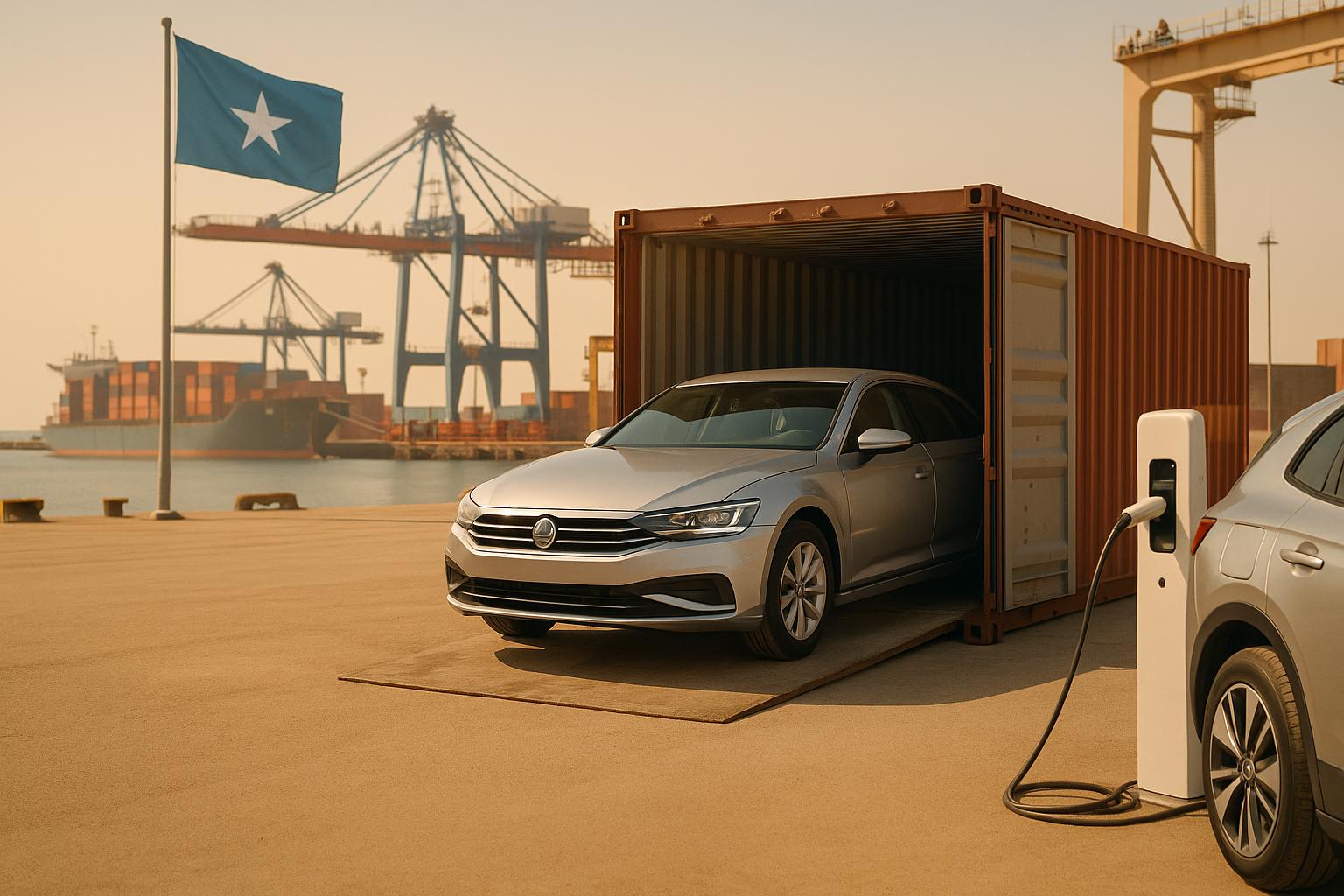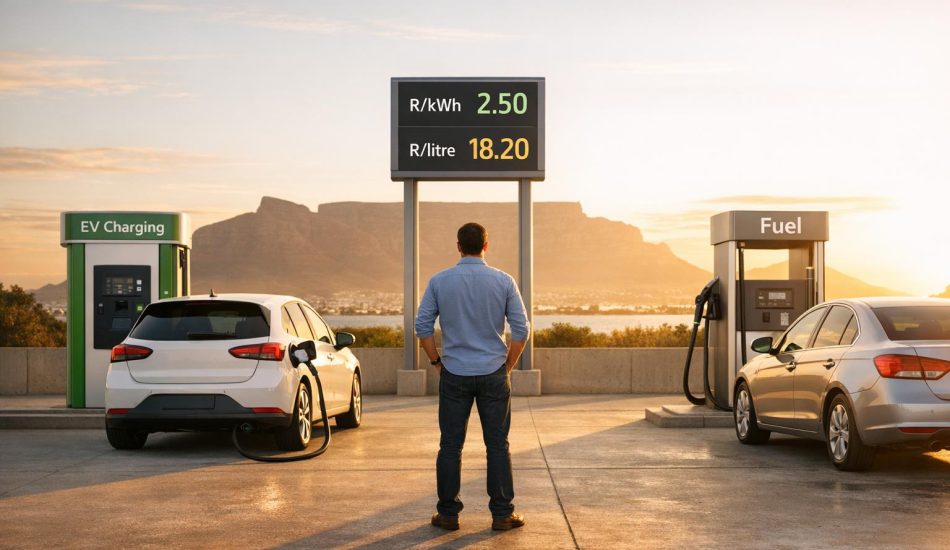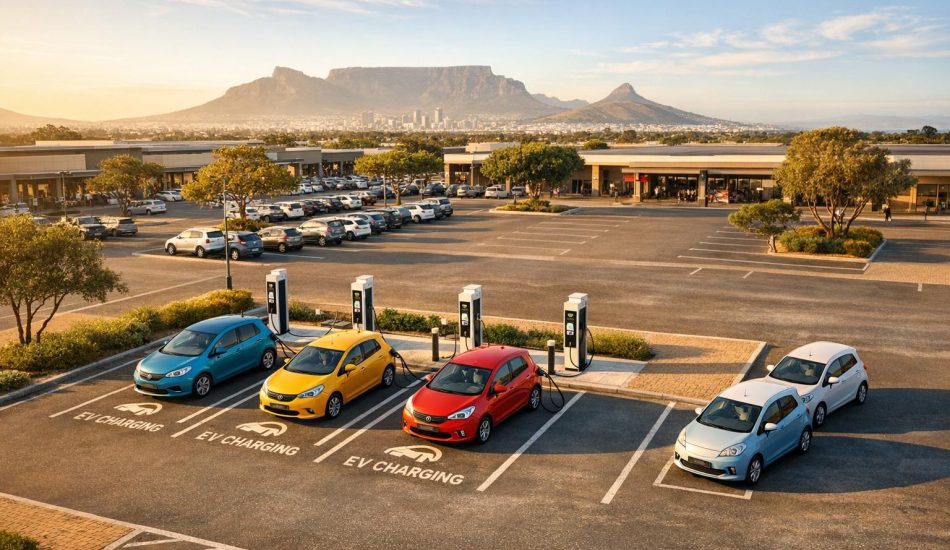
Importing cars into Somalia in 2025 involves navigating updated rules, taxes, and processes, especially with the growing interest in electric and hybrid vehicles. Here’s a quick overview:
- Key Requirements: A roadworthiness certificate, commercial invoice, bill of lading, and other documents are mandatory for customs clearance.
- Taxes and Duties: Import duties start at 25%, with additional taxes like VAT (16%) and excise duty (20%) potentially raising the total to 61% of the vehicle’s value.
- Electric Vehicles (EVs): EVs follow the same import duties as conventional cars, but infrastructure for charging is limited. Services like EV24.africa can simplify the process.
- Regional Variations: Costs and rules vary by port (e.g., Mogadishu, Somaliland), impacting fees and processing times.
To minimize costs, consider slightly used vehicles, choose brands with local service support, and plan your import timing carefully.
Import Rules and Vehicle Restrictions
Somalia’s import regulations are rooted in the 1960 customs law, although regional differences have emerged since 1991. Below, we break down the key rules, restrictions, and regional nuances.
Somalia’s Vehicle Import Laws
The Ministry of Finance Customs Department oversees vehicle imports at all sea ports and airports, handling cargo inspections and duty assessments. A key requirement for all imported vehicles is a roadworthiness certificate, which ensures they meet safety standards. This certification plays a crucial role in determining duty costs and necessary documentation, which we’ll explore in detail later.
Starting in 2025, Somalia has adopted stricter safety and environmental standards as part of its integration into regional trade agreements. These updates reflect the country’s efforts to align with international norms.
Security-Based Vehicle Restrictions
Security concerns and policy measures heavily influence vehicle import procedures and costs. For example, luxury vehicles are subject to additional taxes, sometimes reaching as high as 100% of their landed value in regions like Somaliland. This makes importing such vehicles a costly endeavor. However, exceptions exist: humanitarian organizations, including UN agencies and emergency response groups, are exempt from these restrictions under Article 14 of the 1960 customs law. These varying policies highlight the diverse requirements across different regions.
Vehicle Types Allowed by Port of Entry
The rules for importing vehicles can differ significantly depending on the port of entry, especially in autonomous areas like Somaliland and Puntland. Regional tax structures often include multiple fees, such as sales tax, local government tax, service charges, and stamp duty. These variations can impact both the total cost and the time required for processing imports.
Somalia’s growing involvement in the East African Community Customs Union is another factor to watch. This integration aims to reduce non-tariff barriers and streamline import procedures, potentially creating a more uniform system across the country’s ports.
Required Documents and Compliance
Getting your paperwork in order is a critical step in the import process. The specific documents you’ll need can vary based on your importer status and the port of entry, so it’s essential to prepare accordingly.
Documents Needed for Car Imports
When importing a vehicle, certain key documents are required to ensure smooth customs clearance. These include:
- Commercial Invoice: This outlines the vehicle’s value, including the purchase price, specifications, and seller details.
- Bill of Lading (or Airway Bill): This serves as proof of shipment and legal transfer of ownership.
- Packing List: A detailed list of the shipment’s contents, which helps customs during inspections.
- Certificate of Origin (if applicable): This certifies where the vehicle was manufactured.
- Copy of Your Passport: Used to verify your identity.
- Import License (if required): Some imports may need additional licensing depending on local regulations.
Each of these documents plays an important role in ensuring the import process moves forward without unnecessary delays.
Special Rules for Specific Importers
The documentation requirements can change depending on your status as an importer (e.g., individual vs. business) and the port of entry you choose. It’s a good idea to check for any location-specific rules or additional paperwork that might apply.
Vehicle Safety and Emissions Checks
In Somalia, customs clearance focuses primarily on verifying documentation for taxes and duties. Unlike some countries, Somalia does not require emissions testing or detailed safety compliance certificates as part of the process. This simplifies the import procedure, but it’s still crucial to ensure all your paperwork is accurate and complete.
Import Duties, Taxes, and Total Costs
When planning to import a vehicle, it’s important to consider not just the purchase price but also the taxes and duties that will influence the overall expense. Here’s a closer look at the key factors involved.
Import Duties and Tax Breakdown
The Somali Customs Administration is responsible for regulating import tariffs, which determine the duty and tax rates applied to vehicles. These rates depend on factors like the car’s age, model, and its impact on the environment. Each vehicle category has its own set of rules that can influence the final cost.
For electric vehicles, the same duties as standard passenger cars apply, with no additional fees added for their classification. Additionally, vehicles imported from countries within the EAC or COMESA regions might be eligible for reduced or even zero tariffs, providing potential cost savings.
sbb-itb-99e19e3
Electric Vehicle Import Process and Special Requirements
Bringing electric vehicles (EVs) into Somalia largely mirrors the process for conventional cars, but there are additional steps to address EV-specific technical requirements.
Steps for Importing EVs into Somalia
The paperwork for importing EVs is similar to that of gasoline-powered vehicles. You’ll need a vehicle logbook, a Certificate of Conformity (COC), and standard customs forms.
For those looking to simplify the process, EV24.africa offers a streamlined service that breaks down the importation into four main stages:
- Vehicle selection and purchase: Browse and buy from their online marketplace.
- Shipping and delivery: Choose between RoRo (Roll-on/Roll-off) or container shipping options.
- Customs clearance: EVs are processed like conventional cars through SOMCAS (Somalia Customs Automated System), and EV24.africa handles all necessary procedures and documentation.
- Local registration: They assist with registering the vehicle once it arrives in Somalia.
Import duties remain set at 25%, with no additional fees specific to EVs. However, customs officials may require extra technical documentation, especially for components like the battery and charging equipment. To avoid delays, ensure your customs broker is familiar with EV specifications and provide detailed technical documents in English.
While the import process is straightforward, it’s also important to think about the local EV infrastructure and available support in Somalia.
EV Infrastructure and Government Incentives
Somalia’s EV charging infrastructure is still in its early stages, offering limited options compared to the widespread availability of conventional fuel stations. Most EV owners rely on home charging, typically using standard electrical outlets. Unfortunately, there are currently no government incentives or tax breaks specifically for importing electric vehicles. Any financial savings are likely to come from reduced fuel costs over time rather than upfront benefits.
In urban centers like Mogadishu and Hargeisa, home charging is generally feasible, though rural areas often face power reliability issues. Maintenance is another challenge. While basic services such as tire replacements and bodywork are available, more complex electrical repairs may require importing parts, which can lead to longer repair times. Additionally, few local mechanics have experience working with EV systems, which could further complicate maintenance.
Recommended EV Models for Import
Given the limited charging and maintenance infrastructure, selecting EV models that are durable and easy to service is crucial. For Somalia’s conditions, models available on EV24.africa from brands like BYD, Geely, and Dongfeng are well-suited. These vehicles are known for their reliability in challenging environments.
While Tesla vehicles are technologically advanced, they may not be the best choice due to the lack of local service support and the need for specialized parts. On the other hand, BYD models strike a good balance between features, reliability, and ease of maintenance.
Toyota and Hyundai electric models are also strong contenders, benefiting from established brand recognition and existing service networks in Somalia. These networks can help with basic maintenance and non-electric repairs. Additionally, range is a key factor to consider. Models with a range of 200+ miles are ideal, offering flexibility for longer trips between cities and reducing concerns about running out of charge during daily use.
With transparent pricing and detailed specifications provided by platforms like EV24.africa, importers can make informed decisions based on their needs – whether that’s minimizing upfront costs, maximizing range, or prioritizing long-term reliability in Somalia’s unique operating environment.
Practical Tips for Importing and Cost Reduction
Bringing a car into Somalia requires careful planning to ensure it arrives legally, safely, and within your budget. Here’s a breakdown of the process and some tips to keep costs under control.
Step-by-Step Car Import Guide
Start by researching your desired vehicle. Make sure it meets local regulations and that there’s adequate support for maintenance and repairs in Somalia. If you’re considering an electric vehicle, double-check that the battery specifications and charging system are compatible with the local power grid.
Arrange financing early to cover key costs like shipping, insurance, customs duties, and registration fees. This ensures you’re financially prepared for the entire process.
When choosing a shipping method, weigh your options carefully. Roll-on/Roll-off (RoRo) shipping is usually cheaper, but container shipping provides better protection for your vehicle during transit.
Before shipping, make sure all your paperwork is accurate and complete. Hiring a customs broker who understands Somalia’s import regulations can save you from unexpected fees or delays during customs clearance.
Once the vehicle clears customs, register it promptly. This includes getting Somali license plates, completing any required local registrations, and securing insurance coverage. Following these steps will help you stay compliant while keeping expenses manageable.
Ways to Reduce Import Costs
Once you’ve planned the import process, there are additional strategies to help cut costs:
- Time your purchase wisely. Vehicle prices and shipping rates can vary due to market trends and seasonal demand. Buying during a low-demand period could save you money.
- Choose brands with strong local support. Cars from manufacturers like Toyota or Hyundai often have better parts availability and service options in Somalia, which can reduce long-term maintenance costs.
- Consider slightly used vehicles. A well-maintained, nearly new car can offer modern features and reliability at a much lower price than a brand-new model.
- Bundle services. Companies like EV24.africa offer comprehensive packages that cover everything from vehicle purchase to local registration. This can simplify the process and provide transparent pricing without hidden fees.
- Select the right port of entry. Larger ports, such as Mogadishu, offer a wide range of services but may experience delays during busy times. Smaller ports in areas like Somaliland or central Somalia might process shipments faster and at a lower cost.
- Keep detailed records. Tracking all expenses and paperwork can help you avoid duplicate charges and support any future claims or tax deductions.
Working with Somalia’s Main Ports
The port you choose for your vehicle’s arrival can significantly impact the efficiency and cost of the import process.
Mogadishu, as the country’s busiest port, handles a large volume of vehicle imports and offers extensive services. However, you may encounter delays during peak periods. Alternatively, ports in regions like Somaliland or central Somalia might be less congested, offering quicker processing times and potentially lower fees, especially for smaller shipments.
To ensure smooth processing, maintain complete documentation and stay in regular contact with your customs broker. Once your vehicle arrives, inspect it thoroughly for any damage, and report issues to your insurance provider immediately. Additionally, plan your logistics in advance – whether it’s arranging transportation or securing necessary permits – to avoid unexpected delays or extra charges.
Key Points for Importing Cars to Somalia
Bringing vehicles into Somalia requires navigating a maze of regulations, paperwork, and costs that can significantly impact both your budget and timeline. The standard import duty is 25%, but when you factor in additional taxes like excise duty (20%) and VAT (16%), the total tax burden can climb to as much as 61% for certain vehicles.
Having the right documentation is non-negotiable. Importers must present a Certificate of Conformity, a Roadworthiness Certificate, and all necessary customs paperwork to clear the vehicle through Somali customs. Missing or inaccurate documents can lead to costly delays and penalties.
For those importing electric vehicles (EVs), additional considerations come into play. You’ll need access to private charging infrastructure and ensure that the vehicle’s battery is compatible with local power systems. Unfortunately, there are currently no tax breaks or incentives for EV imports.
There are, however, special exemptions available for specific groups. For instance, temporary foreign residents can import one vehicle duty- and tax-free within their first six months of arrival. Similarly, returning nationals are eligible for duty exemptions on a single vehicle. These exemptions can lead to significant savings compared to the standard import process.
The choice of port is another critical factor in managing costs and processing times. Importers should evaluate shipping methods like Roll-on/Roll-off (RoRo) or container shipping to streamline their logistics. This is especially relevant for EV importers, where port strategy can directly affect efficiency.
For EV imports, services like EV24.africa simplify the process. They handle everything from vehicle selection and purchase to customs clearance, local registration, and ongoing support, ensuring compliance and clear pricing every step of the way.
"At EV24.africa, we simplify the process of importing and buying electric vehicles in Africa. Our expertise ensures a seamless, transparent, and stress-free experience, so you can focus on driving the future of mobility." – EV24.africa
Lastly, careful budgeting is crucial. Beyond the vehicle’s price and import duties, you’ll need to account for shipping fees, port charges, broker fees, insurance, and registration costs. By planning thoroughly and adhering to all requirements, you can avoid unexpected expenses and ensure a smoother import experience.
FAQs
What should I keep in mind when importing electric vehicles to Somalia, considering the limited charging infrastructure?
When bringing electric vehicles (EVs) into Somalia, a key consideration is the limited availability of charging stations. To navigate this challenge, opting for an EV with an extended range or one that offers portable charging options can make a significant difference.
It’s also essential to confirm that the EV model meets Somalia’s import regulations. If public charging isn’t readily available, you might need to factor in the cost of setting up private charging equipment. Additionally, take into account local energy prices and the stability of the power grid to ensure smooth and efficient EV usage.
Are there any tax exemptions or reduced tariffs available for importing vehicles into Somalia?
When importing vehicles into Somalia, certain tax exemptions or reduced tariffs might be available, particularly for humanitarian organizations. For example, shipments related to humanitarian aid are often exempt from duties and taxes, as long as all government requirements are properly fulfilled.
To benefit from these exemptions, organizations typically need to provide documents like operational plans, annual budgets, and detailed reports to the appropriate authorities. Ensuring that all paperwork is accurate and submitted on time is crucial to prevent any delays or potential penalties.
How can I reduce costs and streamline the process of importing a vehicle into Somalia in 2025?
To cut down on costs and ensure the vehicle import process into Somalia in 2025 goes smoothly, keep these tips in mind:
- Pick a vehicle that fits regulations: Make sure the car you choose complies with Somalia’s rules on age and emissions to steer clear of added fees or penalties.
- Hire a licensed customs agent: Partnering with an experienced agent can help you handle the required paperwork correctly and avoid expensive mistakes.
- Stay updated on import rules: Regularly check for updates to import policies or tax exemptions that might save you money.
Proper planning and staying informed can help you avoid surprises and streamline your vehicle import experience.




